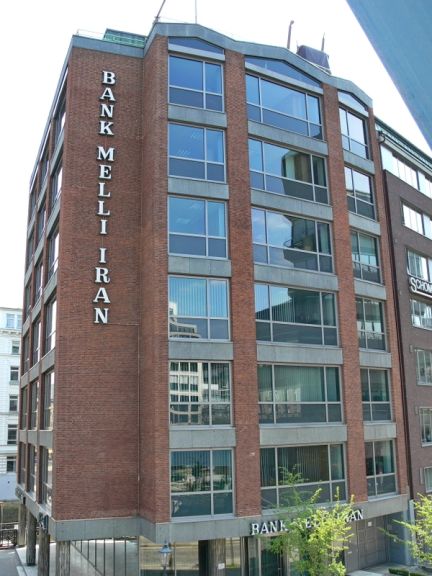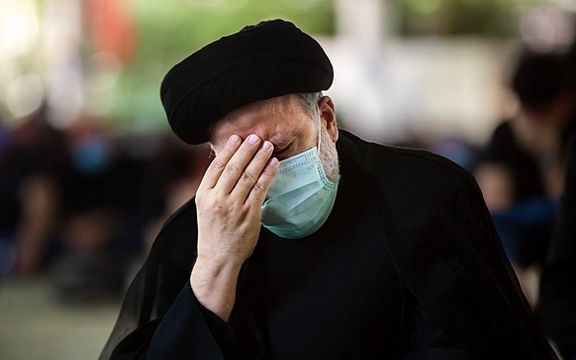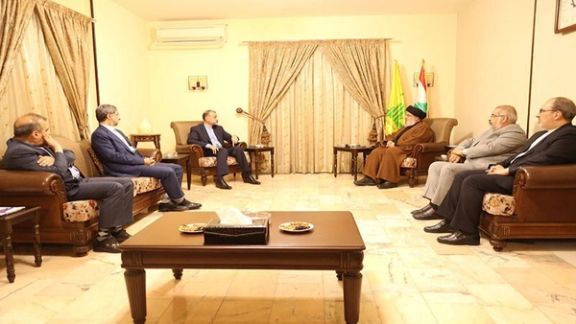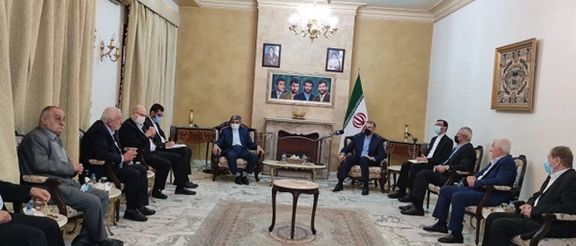German Finance Regulator Bans Bank Melli Iran From Issuing Loans

German finance regulator BaFin said Friday it had banned a Hamburg-based branch of Bank Melli Iran from issuing loans citing infringement of transparency rules.

German finance regulator BaFin said Friday it had banned a Hamburg-based branch of Bank Melli Iran from issuing loans citing infringement of transparency rules.
"BaFin had identified contraventions of the requirements for proper business organisation within the meaning of section 25a (1) of the German Banking Act caused by infringement of the four-eyes principle," BaFin said in a statement.
BaFin said its order became final on Oct. 7. It is not clear if the infringements had anything to do with US banking sanctions on Iran.
Iranian banks have opaque practices and an international watchdog, the Financial Action Task Force (FATF) has put Iran on its blacklist along with North Korea for lack of financial transparency. This has put limits on Iran's banking relations with the world.
US sanctions have also impacted Iran's banking system. Former US President Donald Trump withdrew from the 2015 nuclear accord between Iran and world powers, including the European Union, and reimposed a wide array of sanctions on the Islamic Republic, which made it almost impossible for Iranian banks to do business in the West.
The Biden administration wants to revive the accord.

Reports of a halt in Iranian trucks entering Turkey were "completely fake and mischievous," Iran's Consul-General in Erzurum, eastern Turkey, said Thursday.
Sajjad Soltanzadeh, said he had been told by Turkish customs that trucks were moving both ways as usual between the two countries and that 400 Iranian trucks had entered Thursday.
Ozjan Alash (Özcan Alaş in Turkish), president of the Turkish Association for Development of Trade with Iran, told Russia's RIA Novosti Thursday that Ankara had stopped Iranian trucks in retaliation for Iran denying entry to Turkish trucks. “The trade turnover between Iran and Turkey has been completely suspended due to the tense situation on the border between Iran and Azerbaijan,” Alash said.
Alash expressed concern over any restrictions, given trade had already plummeted due to the Covid-19 pandemic. United States ‘maximum pressure’ sanctions introduced in 2018 slashed Iran-Turkey trade from around $10 billion to 5.6 billion in 2019. From January until the end of Julythis year it was $2.5 billion.
Turkey is a close ally of Azerbaijan and has supported it over rising tensions with Iran, which have centered on Tehran’s vehicular access to Armenia through territory occupied by Azerbaijan since last year’s Armenia-Azerbaijan war.Azerbaijan has arrested some Iranian truck drivers and introduced taxes for using the land corridor through which Iranian commerce reaches Armenia, Russia, and Europe.
Baku also began military drills with Turkey and Pakistan September 12, while Tehran has held its own extensive military exercises near the Azerbaijani border.
Mostafa Ayati, former transit director general of the Iranian Customs Organization, told Eghtesad Online Wednesday that Iran should improve its maritime infrastructures in the Caspian Sea as way to Europe without using land routes through Azerbaijan, Armenia, and Turkey.
Ayati said that Iranian truck drivers travelling through Armenia had lately tried to enter Russia through Georgia, rather than Azerbaijan, but had found the border closed for refurbishment.
But Ruhollah Latifi, spokesman of Iranian Customs Organization, denied reports that Georgia had denied entry, saying traffic through Armenia and Azerbaijan to Georgia continued as usual.
An official of Iran-Georgia Chamber of commerce, Maryam Soltani, told the Iranian Labour News Agency (ILNA) Thursday that she had confirmed with the Georgian embassy in Tehran its borders had not been closed to Iranian trucks. She stressed that Iranian drivers preferred the route through Azerbaijan due to the difficulty and extra cost of using the mountainous road through Armenia.
According to Azerbaijan's national carrier, Azal, Yerevan on 6 October opened its airspace to Azerbaijani planes going to its enclave, the Nakhchivan Autonomous Republic (NAR). This followed reports that Iran had closed its airspace to Azeri military traffic going to NAR.

A group of plaintiffs have made a formal request for the arrest of Iran's President Ebrahim Raisi if he travels to Scotland to attend a climate conference.
The Cop26 climate summit in Glasgow will take place in November and some reports from Tehran indicate Raisi might attend the gathering. President Joe Biden and Pope Francis are scheduled to take part.
Raisi is accused of being part of a group in 1988 that executed thousands of Iranian political prisoners serving time. Before becoming president in June, Raisi spent decades in Iran’s notorious judicial system as a judge and prosecutor.
Human rights organizations and UN experts have demanded accountability fro the Iranian president and international investigation of his role in the killings.
Human rights activists, victims of torture and their relatives have asked the police in Scotland to investigate Raisi using the legal concept of universal jurisdiction, whereby any country can charge an individual suspected of crimes against humanity.
Another Iranian citizen is now on trial in Sweden for his role in the 1988 killings based on the same legal principle.

Kazem Gharibabadi, Iran’s envoy to international organizations in Vienna, including the International Atomic Energy Agency, will leave his post on October 15.
Fars news agency close to Iran’s Revolutionary Guard reported late Thursday that Gharibabadi has been appointed as the head of Islamic Republic Judiciary’s international affairs department.
The post was held by hardliner functionary Ali Bagheri-Kani until he was appointed as deputy foreign minister by Iran’s new foreign minister Hossein Amir-Abdollahian.
Gharibabadi, who has held the post for the past three years is the son-in-law of former Revolutionary Guard general Mohammad-Bagher Zolghadr, who is currently the secretary of the Islamic Republic’s Expediency Discernment Council, a constitutional body.
Fars reports that Gharibabdi’s name had been mentioned as a possible foreign minister or head of the foreign ministry’s international legal department when President Ebrahim Raisi (Raeesi) was selecting his cabinet in July and August.
He was appointed by former foreign minister Mohammad Javad Zarif.
He had previously served as ambassador to Holland.

On the second day of his visit to Lebanon, Iran’s foreign minister Hossein Amir-Abdollahian met with the leader of Hezbollah, Hasan Nasrallah on Friday.
Reports by semi-official sources did not reveal many details about the meeting, except that the two sides praised one another and their mutual cooperation.
Amir-Abdollahian pledged full support for Lebanon, which is experiencing an unprecedented economic crisis. Iran recently shipped fuel to alleviate a serious shortage in Lebanon, but beyond that Tehran itself faces an economic crisis mainly because of US sanctions.
Nasrallah thanked the Islamic Republic of Iran for standing next to Lebanon and the “resistance forces”, a reference to Tehran’s allies and proxies in the region.
“Iran has proven that it is an honest and faithful friend, who does not leave its friends alone no matter how difficult circumstances might be,” the Hezbollah leader said.
Hezbollah, with overwhelming influence in Lebanon in the last decade, and traditional Lebanese politicians are blamed for the economic crisis that ensued in 2019, by repeated political deadlocks and factional discord.

Iran's Foreign Minister in Beirut on Thursday met with officials of Palestinian groups and pledged Tehran's support for resistance against the "Zionist enemy".
Two of the most prominent Palestinians in the meeting were the leader of the Palestinian Islamic Jihad Ziyad al-Nakhalah, and senior Hamas member Osama Hamdan.
In his meeting with representatives of Palestinian groups at the Iranian embassy in Beirut,foreign minister Hossein Amir-Abdollahian said he had stressed in a meeting with the UN Secretary General Antonio Guterres in New York during the annual UN General Assembly summit that the Islamic Republic Supreme Leader Ali Khamenei and the Iranian people will continue to support the "resistance and Palestine until the liberation of all historical Palestinian lands and liberation of Al-Quds (Jerusalem) and Al-Aqsa Mosque."
He also described the “battle of Seif Al-Quds” (Sword of Jerusalem) -- clashes between Palestinians and the Israeli Police in May – as an extremely significant event. "These operations undercut the plan for normalization of [diplomatic] relations [between Arab countries and] the Zionist regime.
Islamic Republic’s support to militant groups in the region goes back to its establishment in 1979, when Iranian revolutionaries were quick to establish ties with various Palestinian and non-Palestinian militants. In the recent decade, with Iran’s full involvement in the Syrian and Yemeni civil wars, Iran’s policy of interference in regional countries has emerged, with Western governments demanding that Tehran change course.
Amir-Abdollahian had also met with leaders of Palestinian groups in Damascus on August 30 during his second regional trip after his appointment as foreign minister. These included Talal Naji, secretary-general of the Popular Front for the Liberation of Palestine, Khalid Abdal Majid, secretary-general of the Palestinian Popular Front, Abu Saeed Al-Maniawi, senior Palestinian Islamic Jihad official, and officials of the Democratic Front for the Liberation of Palestine and Palestinian National Liberation Movement. "If it were not for the support of the Islamic Republic of Iran, the victories of the resistance axis in Lebanon, Syria, Iraq, and Yemen would not have been realized today," Naji told reporters after the meeting.
The Iranian foreign minister on Thursday held a flurry of separate meeting with top Lebanese officials including President Michel Aoun, a key ally of the Iran-backed Lebanese Hezbollah, Parliament Speaker Nabih Berri, the recently appointed Prime Minister Najib Mikati, and Foreign Minister Abdullah Bou Habib. On Thursday he also visited the Supreme Islamic Shia Council of Lebanon where he met with the family of the late Musa al-Sadr, the Iranian-born Lebanese scholar and political leader who founded the Amal Movement in 1974.
In a news conference after his meeting with Lebanese officials Thursday, Amir-Abdollahian said if asked by the Lebanese government, Iran would be willing to participate in the rebuilding of the port of Beirut which was destroyed in a massive explosion in August 2020 as well as two power plants, one in Beirut and another one in south Lebanon within a year and a half.
On Wednesday dozens of Lebanese citizens rallied in Beirut ahead of the Iranian foreign minister's visit to protest what they said is Iran's growing influence in Lebanon.